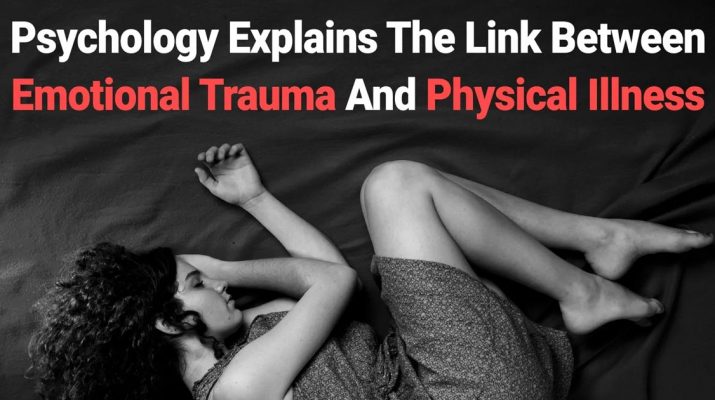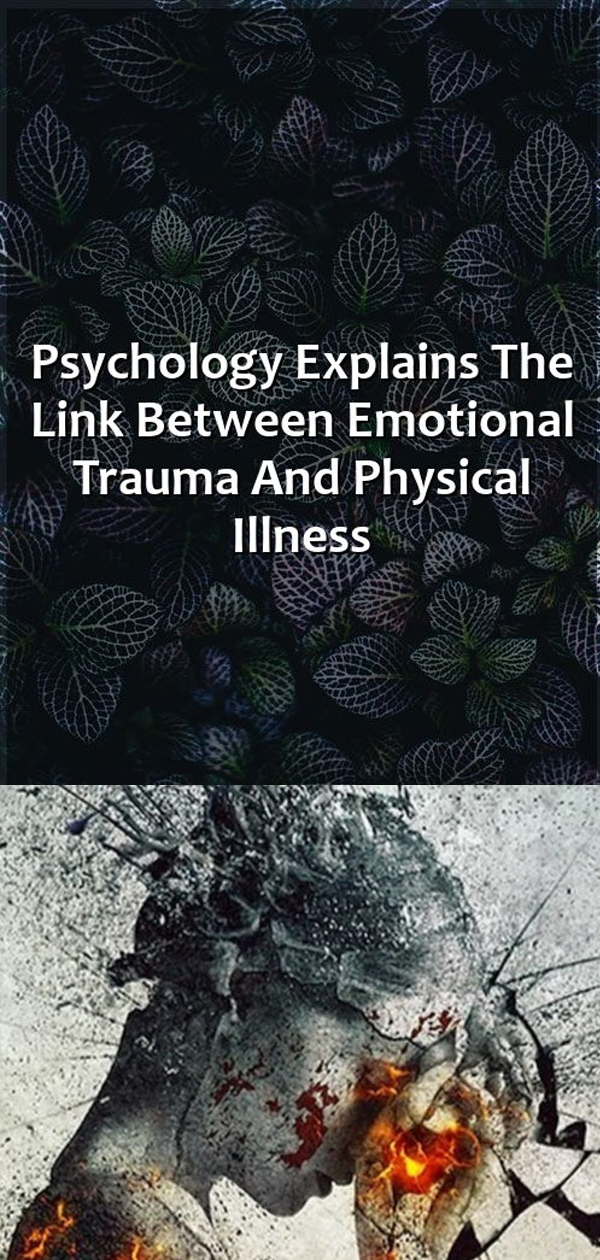Psychology explains that even a seemingly small emotional trauma in your life can be blamed for physical illness in the body. Emotional dis-ease is not limited to those who seek help from a professional. We often connect emotional trauma with an extremely negative past event that deeply affects the psychology of a person, causing mental and even physical symptoms associated with memories of the traumatic event.
However, even a negative interaction with a person today at the grocery store could leave you with lingering unwanted physical effects. In this article, we will explore the causes of emotional trauma, the negative physical effects of illness due to trauma, and how we can respond differently for our best possible future outcomes.
Causes And Physical Symptoms Of Emotional Trauma
Perhaps disease, or dis-ease, is just that – a feeling of being uneasy about something emotional. We then continue to remember and carry the physical sensations of that uneasy moment around with us. Psychology is beginning to uncover our connections between these traumatic moments and our physical health.
Physical trauma and emotional trauma often go together when we think about our past. For example, you can likely easily complete the blanks in the following sentence:
*I began to have a problem with my ______ (physical symptoms) right after ________ (a specific event happened).
Feelings of anxiety or stress are often the result of an emotional trauma since we worry that the same thing will happen to us again. Anxiety is linked to physical symptoms and illness such as:
- Insomnia
- Numbness and tingling of extremities
- Heart palpitations
- Dry mouth
- Breathing problems and asthma
- Nausea
- Tension headaches
- Muscle tension
- Dizziness
Emotional Trauma And Physical Suffering
It is possible that many more of us have Post-Traumatic Stress than show up in the psychologist or counselor’s office needing help. For example, a friend confided that a male partner told him at a young age that he was a “bad kisser.” He has been reluctant to kiss ever since, even though he is an adult now and his partner has encouraged him with positive feedback.
This type of emotional trauma is likely not thought of as a “traumatic” event by the person who was told he was a “bad kisser.” However, the fact that he is continuing to live with the negative effects of the event makes it an emotional trauma. Now, did a lack of kissing cause him a physical illness? Not likely, however, he is likely missing out on opportunities to connect more intimately with his partners.
Also, he might experience physical symptoms of stress when faced with a situation involve the act or even just the possibility of kissing. (See our related article for behaviors of someone who suffers from emotional trauma.)
In a previous positive research article, we discussed how Harvard researchers say that the gut is extremely sensitive to emotions. Imbalances in gut bacteria are linked to depression, anxiety, autism, and ADHD. Our mood and mental health are connected to physical illness, which can be measured in our gut microbe health. Feeling upset to your stomach is possibly your gut instinct telling you that you are feeling anxiety.
Links Between Emotional Trauma, Inflammation, And Illness
Research on the connection between physical illness and emotional trauma has discovered that bodily fluids such as urine, blood, and cerebrospinal fluid can be tested for ORP (Oxidative Reduction Potential; a measurement of the presence or lack of anti-oxidants). What is more, researcher indicate that this “measurement can be useful in evaluating acute diseases, such as traumatic brain injury, severe sepsis, stroke, and myocardial infarction, as well as chronic diseases, such as Alzheimer’s disease and atherosclerosis.”
These psychologists also cite previous research showing that those with a traumatic brain injury showed increased ORP levels compared to those in healthy individuals. This indicates the presence of oxidative stress.
Oxidative stress is correlated with aging, inflammation, illness, and disease in the body. Times of high stress result in high levels of inflammatory chemicals being produced in the body, chemicals such as the stress hormone cortisol.
Psychology is learning that some of those who later develop Post-Traumatic Stress Disorder (PTSD) may be born to parents who themselves had PTSD. At birth, these babies had higher levels of the stress hormone cortisol than those born to parents without emotional or physical traumas.
How To Respond To Emotional Trauma For Better Outcomes
Once we are aware of trauma, what can we do to avoid the resulting physical illness and symptoms of stress? Psychologists say that responding differently to stressful events and practicing the skill of responding differently is one effective technique.
Here’s how to accomplish this:
-
Awareness Is Key
- Try to identify where you feel negative emotion in your body
Scan your body for sensations of tightness and unease
What feels off/different than usual?
-
Identify A Physical Symptom That Correlates To The Time Of The Emotional Trauma
When ____ happened, I felt ____
-
Identify How An Emotional Trauma Feels In The Body And Focus On A Positive Sensation Instead
- ______ (an event) makes me feel frustrated/angry/upset/depressed
- Read our related article in which psychologists explain how to release emotional attachments in toxic personal relationships
- Think of how that negative emotion physically feels in your body (I get all tense, my side hurts. It makes me feel nauseous. I get a headache when I think about it.)
- Focus on a positive body sensation or thought to associate with the trigger instead (a pleasant warmth or tingle, or thinking of the feeling as a higher vibrational alert system for example)
-
Identify A Negative Emotional Response And Substitute A Positive Response
- First, complete the following sentence:
I get so frustrated when _____ (event) happens that I ________ (respond with negative emotion or feeling) - Second, list five different activities or responses you can do the next time you feel the negative emotion after the event that triggered it.
- First, complete the following sentence:
Some examples:
- deep breathing
- a walk outdoors in nature
- a yoga pose
- listening to a meditation or affirmation
- squeezing a stress ball
Choosing A Positive Attitude About The Physical Illness
British scholars of The Institute of Integrative Health studied people who had experienced a variety of traumas, from physical, mental, or emotional to ongoing disabling conditions. They explain that “Moving from being wounded, through suffering to healing, is possible. It is facilitated by developing safe, trusting relationships and by positive reframing that moves through the weight of responsibility to the ability to respond.”
Positive-thinking people apply the following positive thoughts. “I …
- … learn, grow, and forgive myself if I made a mistake.”
- … congratulate me on trying.”
- … fail to blame anyone.”
- … don’t hold regrets.”
- … focus on how much better next time will be because I’ll know the trigger.”
- … can see and laugh about my usual tendencies to hunch my shoulders and I can choose to drop my shoulders and relax those muscles.”
- … choose to take several nice deep breaths.”
- … can choose to know that I am safe, even with my eyes closed.”
- … give myself the gift of a relaxing moment.”
- … trust my inner guidance.”
Be Inspired To Release The Stigma Of Mental Illness By These Celebrities Who Are Doing It.
Choosing your attitude is taught even in management to improve employee morale. The Pike Place Fish Market in Seattle, WA inspired the FiSH Philosophy training program. This program basically tells the world that you can have a job where you have to handle fish all day or you can have a job where you have a great time and engage with others in a fun way while doing that same thing. You get to choose.
In other words, we can take back a portion of our sense of control in an uncontrollable world. How? We choose to smile about a tense situation and our reaction to it. If you can reframe your fearful thoughts about being triggered by emotional trauma into having a laugh at your response, maybe others will have a laugh too, not at you, but at what they see of themselves in your honest vulnerability.
Healing Emotional Trauma And Illness With The Gift Of Self-Care
Awareness is the positive-thinking start of healing from emotional trauma; however, caring for our emotional needs is key. When we have negative emotions, we must gain enough positive ones to create a sense of balance for ourselves. As you learn to focus your attention on becoming aware of negative thoughts about a traumatic emotional event, and the corresponding bodily sensations associated with the negative emotion, you can turn your focus to say:
“I choose to be the best person I can be, in spite of the emotional trauma and my physical illness.”
The best gift you can give yourself is self-care to heal from both the physical illness and the emotional trauma. Whatever brings you joy, positive physical feelings, and positive responses in your mind is where you should spend extra time as you heal. This might be reading, doing yoga, or interacting socially with people who love you and support you.
It likely is not commiserating about how bad things are for you and others. After all, misery loves company, but you don’t need that kind of friendship when your positive goal is health.
Note: Always consult your wellness advocate before starting any new regimen.


